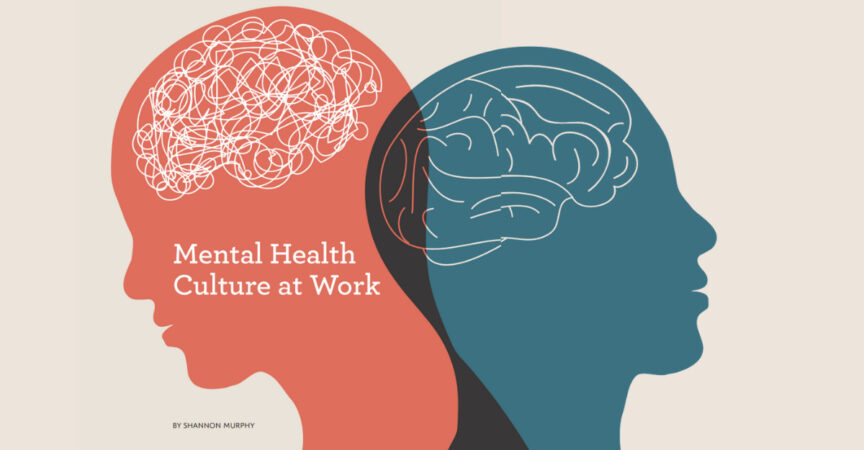Mental Health Culture at Work
Karen Davidson, General Manager of Marben and the Cloak Bar in Toronto, was recently approached by a staff member asking for extra shifts as she had been off sick with COVID-19. The employee was concerned she was not going to be able to pay her bills due to the loss of income. Davidson had to remind her she had paid sick days and that she had not missed any of the pay she would normally generate. Working in the foodservice sector, her staff member was not used to having benefits or support for mental health, a far too common experience across the industry. Over the past few years, COVID-19 has only amplified the stress, anxiety and financial concerns within the business, taking a toll on the mental health of everyone in the hospitality environment.


The restaurant industry has yet to fully prioritize workplace mental health and psychological safety, yet suffers from some of the highest rates of mental illness in any field. Not only does the foodservice sector face unique issues such as demanding hours and unstable wages, a propensity for an extreme lifestyle, addiction issues and a susceptibility to sexual harassment, many employees don’t speak openly about their mental health struggles for fear of being judged or stigmatized or even losing their jobs.
Stigma is one of the biggest barriers people face when dealing with mental health issues. While some progress has been made in terms of talking about mental health, the stigma of managing mental health remains prevalent within the sector. “If a restaurant manager or co-workers are stigmatizing people dealing with mental health concerns, that can prevent people from seeking help,” explains Esther Fleurimond, Health and Safety Consultant at Workplace Safety and Prevention Services (WSPS). “While we may not be able to eradicate mental health challenges or illnesses, one of the things we can do is eradicate the stigma that accompanies mental health challenges and illness.”
The kitchen brigade system still common in many operations is an artifact from the late 19th century based on the hierarchical system employed by the French military. While its purpose within the food sector is to ensure every person has a clear purpose in the kitchen and works to maximum efficiency, it can breed intense and potentially abusive and exploitative workplaces. “It’s very rare that restaurant chefs come in from any culture other than rising up through the ranks,” says Davidson. “If you’ve been screamed at by your boss, that’s how you’re going to manage your team as well.”
Changing this environment is something that Davidson is passionate about, having grown up in the hospitality industry from a young age, experiencing toxic environments and abusive situations herself or witnessing it happening to other people. She’s worked with numerous organizations such as Not 9 to 5, a non-profit global leader in mental health advocacy for the foodservice and hospitality sector. Their vision is to reimagine the industry by breaking stigmas and normalizing mental health training, sick leave, workplace accommodations and healthcare benefits.
Marben has introduced many measures to support their employees from a mental wellbeing standpoint. “First and foremost, we removed tipping from the building”, explains Davidson. “We wanted to remove that toxicity that can be associated with having the guests decide your value and your performance and some of the entertaining struggles that come along with the tip culture.” Marben has also implemented an Employee Assistance Program which offers staff free access to counselling and therapy as well as a health spending account for full-time staff members.
The reception from Marben’s staff has been amazing. “When you step into the restaurant you recognize right away that we have a very healthy and happy team,” she says. “My staff feel supported by the business and are excited to grow with us. We’re also getting a lot of positive feedback from our guests.”
This happy and healthy environment is a very attractive one, especially to an industry experiencing a massive labour shortage. According to the latest data from Statistics Canada, the number of job vacancies in Canada’s foodservice and accommodation industry rose to 142,320 in December 2021, representing a 10 per cent increase over November, and a three-fold increase compared to December 2020. While the number of job vacancies has soared across all industries in Canada throughout 2021 due to the reopening of the economy, foodservice accounts for roughly 1 out of every 7 job vacancies in Canada, the highest share of all industries. It is vital that we are able to recover these lost jobs. While all other industries have recovered about 90 per cent or more of their pandemic job losses, at least 25 per cent of the foodservice workforce still has not returned to work within the sector.
As the Canadian restaurant economy continues its reopening journey, recruiting and retaining a talented workforce will be challenging due to the large number of jobs available across the nation. But recruiting is critical for restaurants owners to return to a pre-pandemic level of service and to thrive. By promoting mental health and wellbeing as a core workplace value, restaurants will improve their ability to attract and retain employees. Not only does focusing on mental health initiatives provide a hiring advantage, it can improve overall business profitability by reducing disability and absenteeism costs. However, according to a Q3 2021 Restaurant Outlook Survey by Restaurants Canada, only 18 per cent of restaurants are offering benefits such as health care services in response to the current labour shortage.
The mindset has to change from the top and the industry needs to start rethinking its employee value proposition. “I think we need to hold owners and upper management accountable when it comes to mental health challenges in order for our industry to be sustainable,” says Davidson. “It’s important that the restaurant industry aligns itself with other industries.” Fleurimond agrees. “Like the rest of numerous Canadian industries, the foodservice industry must adapt and adjust to a constant change of priorities and promote a psychologically safe work environment for all to ensure its economic survival.” The response from the restaurant industry in incorporating mental wellbeing strategies has been “very timid” according to Fluerimond. “Many restaurant owners are perceiving that investment in mental health programs and resources such as funding an Employee Assistance Program for their employees is too great of a cost when profit margins are already so low and financial resources are strained by the pandemic.”
This is why restaurants need to build that cost into their everyday operations. “An employee assistance program is surprisingly inexpensive for how much they offer,” says Davidson. “I’m not going to claim that overhauling the business model is an easy thing to do, but if you start with understanding exactly what your team’s needs are, that’s a really great first step.” She also suggests working with organizations like Not 9 to 5 which recently launched CNECTed, an online training and certification course developed to increase accessibility to mental health education while addressing specific pain points that exist in the hospitality and foodservice industry.
The WSPS also provides restaurant supervisors, managers, leaders and employees with mental health knowledge and resilience and trust building skills. It can also assist employers in determining how to fulfill the mental health and wellbeing needs of their businesses and provide concrete, actionable steps to promote mental health and reduce mental harm at work.
One of the simplest first steps for operators is talking to staff. “We had quite a few meetings with our team to discuss what they needed when it came to mental wellbeing support,” says Davidson. Understanding whether health insurance is more desirable versus a health spending account, if the team requires access to therapy or how to successfully incorporate sick days into the business can help operators focus on key support elements that resonate with their team. For Davidson, speaking with her staff enabled her “to determine what would serve them best in order to feel supported and demonstrate that their mental health was a priority.”
It’s obvious that the current workplace environment and structure of the foodservice sector needs to be challenged and redesigned in order to evolve to reflect the divergent needs of its workforce. It’s time to advocate for a psychologically safe environment by having non-judgemental and caring conversations about mental wellbeing. “It just feels like the industry that I love so much has done such damage to so many people,” says Davidson. “We are in a significant mental health crisis and it’s time to shine a light on what’s happening with people working in our industry and create better systems for them so they can continue to do what they love in a safer setting. It’s the right thing to do.”
RESOURCES AVAILABLE TO OPERATORS:
WSPS (Search “mental health” for resources.)









